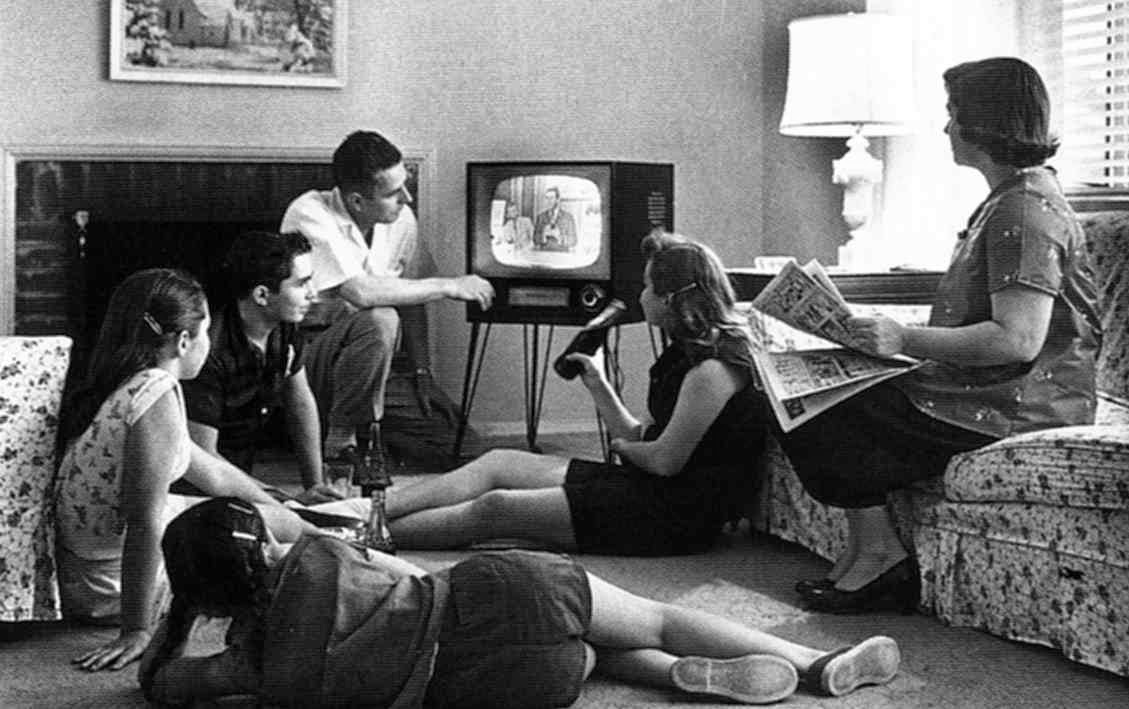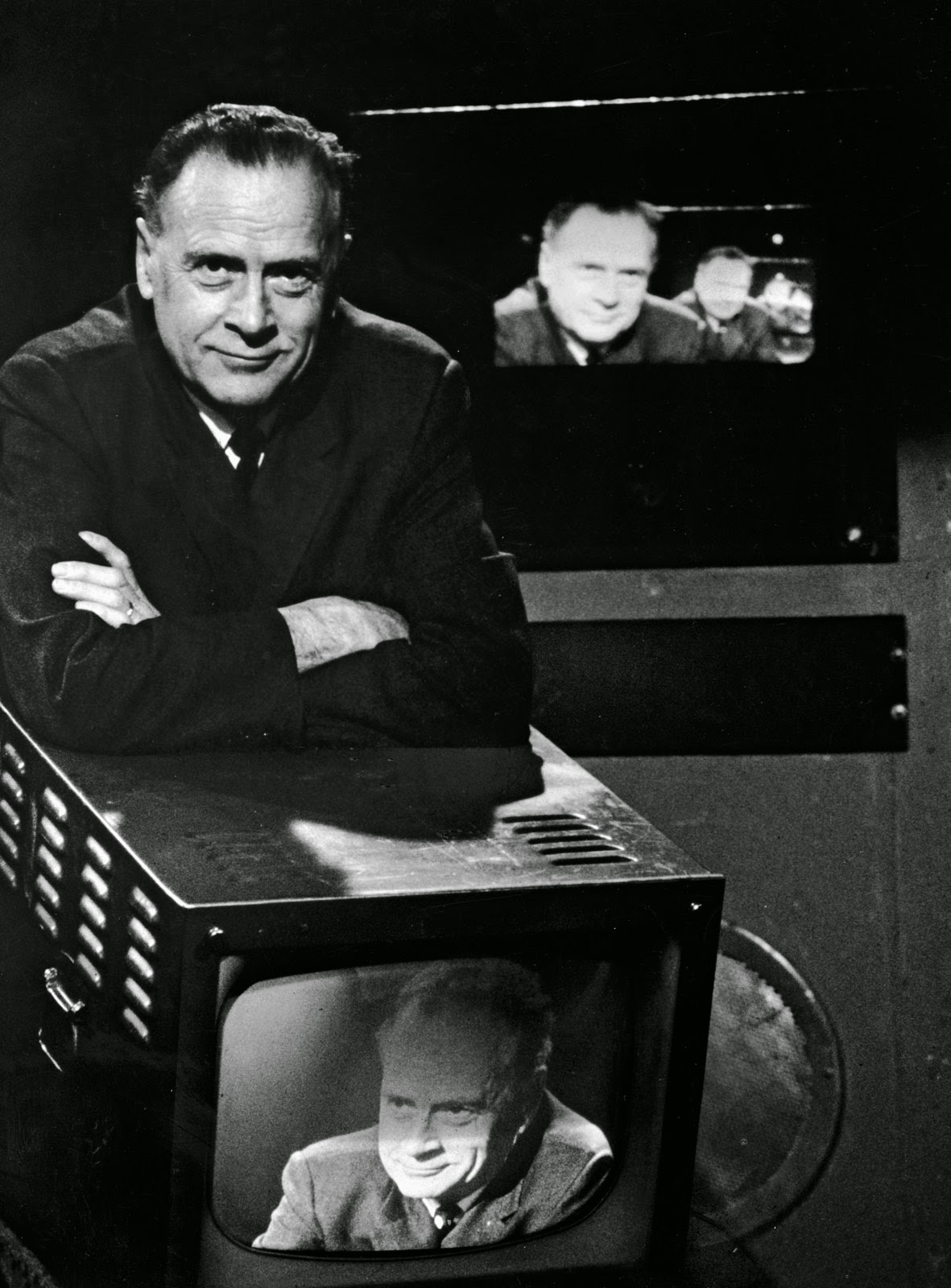In 1939 after the first demonstration
of television a New York Times review of it was as follows, “The problem with television is that
people must sit and keep their eyes glued on a screen; the average American
family hasn’t time for it.” The effect we see today is the complete opposite. The
average American watches 5 hours of T.V. a day, this is 5 hours of life that is
waste staring at a box that provides them with nothing but images. And this
“box” is usually placed in the most valuable and visible part of the living
room. As we complain today saying “we have no time to do anything anymore” we
become blind to the fact that we waste a majority of our time staying “glued on a screen”. So much has changed,
as TV became almost an object of ‘worship’ in which we have come to spend more
time mindlessly with it then we spend with actual people.
Marshall McLuhan, a canonical media theorist, wrote in his book Understanding Media: The
Extensions of Man, “TV will not
work as background. It engages you. You have to be with it… A great many things
will not work since the arrival of TV”(pg. 6), as compared to radio which
serves as “background-sound” TV is a screen that literally sucks you into it’s
contents and does not let you go because it provides a new line of thinking for
the individual, it provides a new medium of imagination that the individual
would rather not have thought about.
As Sherry Turkle had pointed out in her Ted Talk, although we seem to
be connected we are brutally alone, we are physically there but mentally we are
farther away from each other then we have ever been. I imagine we will never be
able to enjoy a hot cup of tea as closely and as connected as once a family
would have before the invention of all this technology, I presume we are
essentially loosing ourselves in this new realm of technology. I believe like
McLuhan had pointed out as the development of the medium in which we
communicate enhanced we have lost touch with the reality of communication. From
telegraphs, to radios, and then to TV right in our houses we have gotten on a
path that is not leading us the right way.
Mcluhan points out, “The effect of TV…is hard to grasp for various reasons. Since it has affected the totality of our lives, Personal and social and political, it would be quite unrealistic to attempt a ‘systematic’ or visual presentation of such influence.”(pg.11) I agree with McLuhan as it is definitely impossible to elucidate the effects of such a concern within our lives because as we are living in this era of technology the world has never seen before and as we see it as an improvement upon humanity we become blind to its negative aspects. Since it has affected the “totality of our lives” we cannot see the major effects of something if we are within it. Although it has essentially been a positive step in politics because we are able to see the presidential candidates and we are exposed to news that we would have rather not heard of from across the world, it has been a step down in the ladder when it comes to viewing it from a social and personal perspective. As Darine points out in her own blog she explicates the ideology of the media changing and shaping our environment, although it has positive effects in our lives it is still negative in the sense that we are shaping our lives on such medium.
Towards the end of his piece, McLuhan pinpoints his ideology of explicating the children of this era to being a TV child he says, “The TV child is an underprivileged cripple”(pg. 29). Although he utilizes such harsh language as “underprivileged cripple” he is correct in his identification of the children of this realm of television. The reason for his ideology is his concern for this generation because ultimately they or I should say we grew up in the glorious image of what the TV had to provide us we were deprived of such wandering imagination, and therefore we are unfruitful in our nature to be creative and in that sense we are “underprivileged” and “crippled”. “Pervaded by the mosaic TV image, the TV child encounters the world in a spirit antithetic to literacy.” McLuhan acknowledged that TV had a profound impact on the way children viewed the world around them, not just what was on it but essentially what was in it, it’s lack of detail and it’s “amplification” of everyday senses provides a world that is much exaggerated in its form. Through this medium the images and the content we are exposed to leads us into growing up in an ‘unrealistic’ state of mind.
It is ultimately upsetting to see what we have brought our selves down to, we are downsizing our own intelligence and human abilities by being hooked to an inanimate object, therefore it is time to stop and think if we are on the right track!





No comments:
Post a Comment